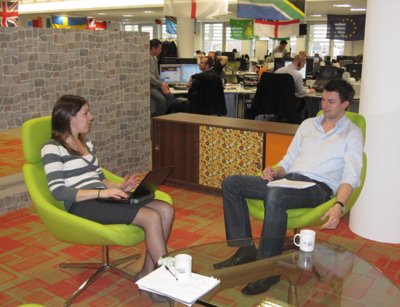Rackspace Hosting is considering setting up a data center in Australia to cater for the Asia Pacific market, but it could have some big challenges ahead with its cloud growth plans if its experience in the UK is anything to go by.
The hosting and cloud computing provider, which set up a data center in the UK last year, is now challenging UK universities to add cloud computing to its curriculum as it faces what it calls a “skills shortage” in the cloud computing space.
Mission 350, as its recruitment and training initiative is called, is aimed at recent graduates and those looking to enter or move about in the IT space, with a goal building cloud-appropriate knowledge.
Yesterday, Rackspace Hosting VP of Cloud Fabio Torlini told FOCUS the traction of cloud services around the world is already putting strain on skills, a situation made worse by the fact that cloud computing requires some different knowledge sets to traditional hosting solutions.
“We have been growing more than 30% per annum, and cloud is now roughly 20% of our overall business,” Torlini said.
“The US had a framework in place, but it is 12 to 18 months ahead of us [in the UK]. But Asia Pacific is growing as well – this is where a lot of companies will probably go straight to the Cloud and miss the hosting.”
He said emerging markets are moving swiftly to the cloud, and that is leading Rackspace Hosting to investigate a second data center in the APAC region – it already has a data center in Hong Kong.
“We may well look at a data center in Australia as well in the not-to-distant future,” Torlini said.
But cloud needs skills
While Rackspace is looking to grow, Torlini said companies like his can no longer rely on skills sets from competitors or those in similar businesses, as they traditionally have.
He said the rise of cloud computing is pin-pointing some key shortages in the industry, not only in the UK but also in other international markets, especially around high-end skills such as Linux and specific knowledge on cloud and open stack, the cloud computing open source software program Rackspace along with vendors and other cloud users contribute to.
“If we talk about getting someone up to level four or five technical abilities, that can take a very long time – at least a few years,” Torlini said.
“We already have systems in place where we can give people lower-end knowledge by bringing them into our data center in support ranks, then [building up skills] but we just don’t have the time.”
He said universities need to be providing curriculum focussed on cloud computing skills.
Rackspace Hsoting cloud customer care manager Joanna Swett has been integral in setting up Rackspace Hosting’s cloud operations in the UK.
After coming from its Texas headquarters, she has interviewed numerous candidates for cloud computing roles in the UK.
She said the difference between traditional hosting and other roles is the broad set of skills required for the Cloud.
“It is not just a cloud technician, we have to go between our core cloud services and our managed cloud services which are really customer focussed,” Swett said.
“You have to be technical and understand customers – you have to offer support, as you are on the phone, but also understand a bit about the software in the Cloud. We get our hands dirty a little more often in this role.”
She said the positive, however, is that most candidates have a passion for the cloud.
“I feel they are more enthusiastic than what I have seen in the past because I think the cloud buzzword has been out there so much – they know it is a momentum in the industry and desperately want to be a part of something new,” Swett said.
Rackspace said it is undertaking a massive recruitment drive throughout 2012. It said its main emphasis will be on candidates with knowledge of core operating systems and experience or knowledge relating to the Cloud.

